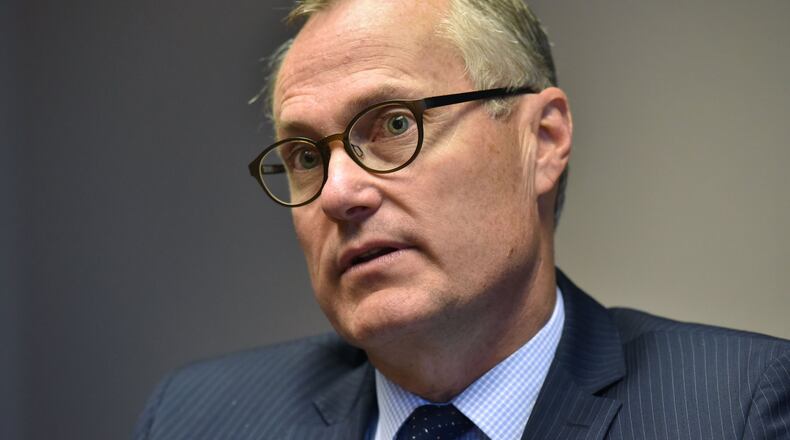Lt. Gov. Casey Cagle launched his campaign for governor with a pledge to add 500,000 jobs in his first four years in office, cut $100 million in taxes in his opening months and a promise to “declare war on high school dropout rates in Georgia.”
The Gainesville Republican laid out his policy platform in an interview with The Atlanta Journal-Constitution ahead of a formal campaign kickoff on Sunday evening. The presumptive Republican front-runner in the 2018 race, Cagle has prepared this campaign for almost a decade.
“We are in it to win it,” he said. “And we have a clear strategy and a clear message that we’ll take to the voters all across the state.”
He has no cakewalk ahead of him in the race to replace a term-limited Gov. Nathan Deal. Georgia Secretary of State Brian Kemp and state Sen. Hunter Hill are already in the race, and a half-dozen other Republican officials or self-described outsiders are considering whether to join.
Should he win the GOP nomination, Cagle will likely face a formidable Democratic opponent who can rake in big fundraising hauls. House Minority Leader Stacey Abrams is widely expected to run, and other Democrats pondering a bid include state Rep. Stacey Evans and Columbus Mayor Teresa Tomlinson.
Cagle comes in with advantages that few others can match. He has won three statewide elections, starting with a 2006 upset victory over Ralph Reed. He’s a proven fundraiser. He’s spent a decade traveling the state to pick up IOUs and line up cash commitments. And he’s had years to craft the policy agenda he began to roll out in the interview.
Cagle said he would quickly appoint an economic development liaison to work with businesses to streamline permitting, and he said he’d hit the road to recruit companies across the nation and the globe with an emphasis on targeting high-tech firms.
“We’ve been successful in being the Hollywood of the South,” he said, “but now we will be the Silicon Valley of the South.”
His goal of creating 500,000 jobs is lofty: Deal put job creation at the center of his campaign, and he said he created more than 319,000 private-sector jobs in his first term.
Casting the I-85 bridge collapse as a “wake-up call,” Cagle said he’d order a new 10-year transportation plan that would rank which roads and bridges most need improvements and identify new corridors to build. He expressed support for more reversible lanes, tunnels and even elevated routes.
“We have to be willing to go up and go under if that is what is going to be required,” Cagle said. “There is nothing that is off the table. It is that important. We cannot afford to be unproductive as a state because we are constantly sitting in congestion.”
He would pursue his tax cut in his first legislative session as governor by increasing the amount that Georgians can deduct from their income tax returns. His proposal would call for the first $12,000 of taxable income for a family of four to be tax-exempt, and it also would seek an increase in standard deductions.
And Cagle wants to vastly expand the network of about 40 college and career academies across the state, with the goal of driving down the high school dropout rate. And he said he’ll pour more state resources into boosting third-grade reading proficiency.
An owner of a tuxedo rental business, Cagle was elected to the Georgia Senate in 1994 at the age of 28 when he upset a Democratic incumbent.
After his upset 2006 victory over Reed, a former Christian Coalition leader with a national profile, he set his sights on the governor's office. He filed paperwork in 2008 to run for governor and raised more than $1.4 million for his campaign before dropping out in April 2009, citing problems with his back.
He said there's no turning back this time. He wrote a book about education policy that was published last year, and he's tried to smooth ties with powerful business groups about a "religious liberty" proposal that he initially supported.
And he’s raised more than $500,000 in his lieutenant governor’s account since winning another term, even though most of the Capitol donors knew he planned a gubernatorial run.
He’s pledged to run on an optimistic message, saying those who want to tear down their rivals “don’t deserve to be in office.”
“I don’t have to be governor. But I want to be governor,” he said. “I want to continue to make a significant impact in the lives of Georgians. I want to make sure I’m able to give back to a state that has given so much to me.”
About the Author
Keep Reading
The Latest
Featured




